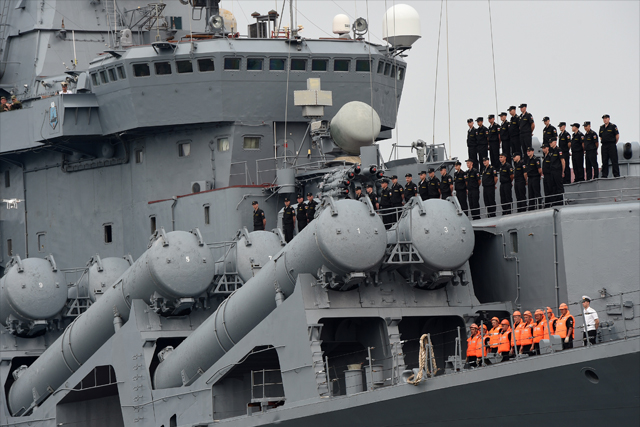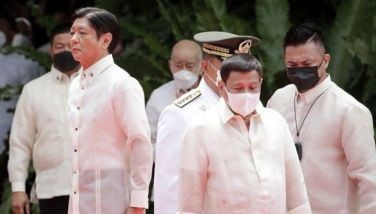Commentary: Applying Abe’s Democratic Security Diamond in the Philippines

Russian sailors of the missile cruiser Varyag stand next to the missile launch pad as the vessel arrives at the international port of Manila on April 20, 2017. AFP/Ted Aljibe
In the recent ASEAN meetings, President Donald Trump revitalized the term “Indo Pacific’” to refer to Asia, as opposed to the traditional “Asia Pacific.” The use of “Indo Pacific” is not merely a change in nomenclature, it highlights not only the changing regional order or dynamics but is a manifestation of the anticipated shift in strategic framework.
Relevance of Japan’s Democratic Security Diamond
In the recently published Special Study of the Stratbase ADR Institute entitled “The Special Japan-Australia Strategic Partnership within the Ambit of Democratic Security Diamond: Seeking Partnership with the Philippines in Maritime Security,” Dr. Renato De Castro has described Democratic Security Diamond (DSD) as “a brain child of Japanese Prime Minister Shinzo Abe, it was formed by four naval powers – Australia, India, United States and Japan – to safeguard the maritime commons stretching from the Indian Ocean to the Western Pacific.”
Due to the recent Chinese activities in the region that have undoubtedly changed the regional geopolitical balance and status quo in the region, cooperation among the four democratic countries is needed. On the sidelines of the ASEAN Summit, Japan, Australia, US and India reportedly met to discuss regional and global cooperation under the proposed concept of DSD.
Emphasis on like-minded democracies
The DSD is an entente of like-minded democratic countries. In the study, De Castro emphasized that Japan and Australia, which are both members of the DSD see the need to forge closer bilateral ties and links with third countries, especially other like-minded “middle powers” with shared values and interests. Further, it has likewise been observed that Australia and Japan have been proactive in seeking a convocation of like-minded states to offset a rising Chinese Power and declining US influence in the Asia Pacific. Indeed, like-minded countries have a significant role to play in preserving the security and status quo of the region. Other main claimants in the South China Sea like Vietnam, Indonesia, Philippines, among others should likewise be considered as members of the DSD, as these countries share the same value and interest of maintaining status quo.
What’s in it for the Philippines?
Within the DSD, aside from the US, Japan and Australia are considered to be staunch allies of the Philippines in enhancing its maritime capabilities. Indeed, both countries which have likewise enhanced their bilateral security ties, have been actively involved in assisting the development and maritime capacity-building of the Philippines, especially in light of increasing Chinese activities in the West Philippine Sea. As proposed by De Castro, Japan's and Australia’s unequivocal commitment to this strategic coalition should be maximized by the government by managing a vigorous and friendly relationship with the US as this would enable the Philippines to expand its bilateral relations with other allies; establishing a rapprochement with China without sacrificing a healthy diplomatic distance; forging a common Visiting Forces Agreement with Japan and Australia; and lastly, explore the prospect of a trilateral Japan-Australia-Philippines Strategic Partnership.
Future of DSD in the Philippines
During the launch of De Castro’s special study, defense analyst Jose Custodio opined that the DSD is not a concept to be scoffed as it consolidates the world’s most powerful economies and militaries. He further added that given the current political and security landscape of the Philippines, there are two possibilities that could happen. One is that the DSD will choose to write off the Philippines and consider DSD to be irrelevant due to the administration’s priority on domestic issues. In the alternative, states may choose to take advantage of the growing insecurity through engagement with institutions that enable cooperation.
Moving forward
While the Philippines should maximize its bilateral ties with its like-minded countries and the strategic framework brought about by the DSD, it should not take on too many commitments lest to the detriment of its other interests.
- Latest






























